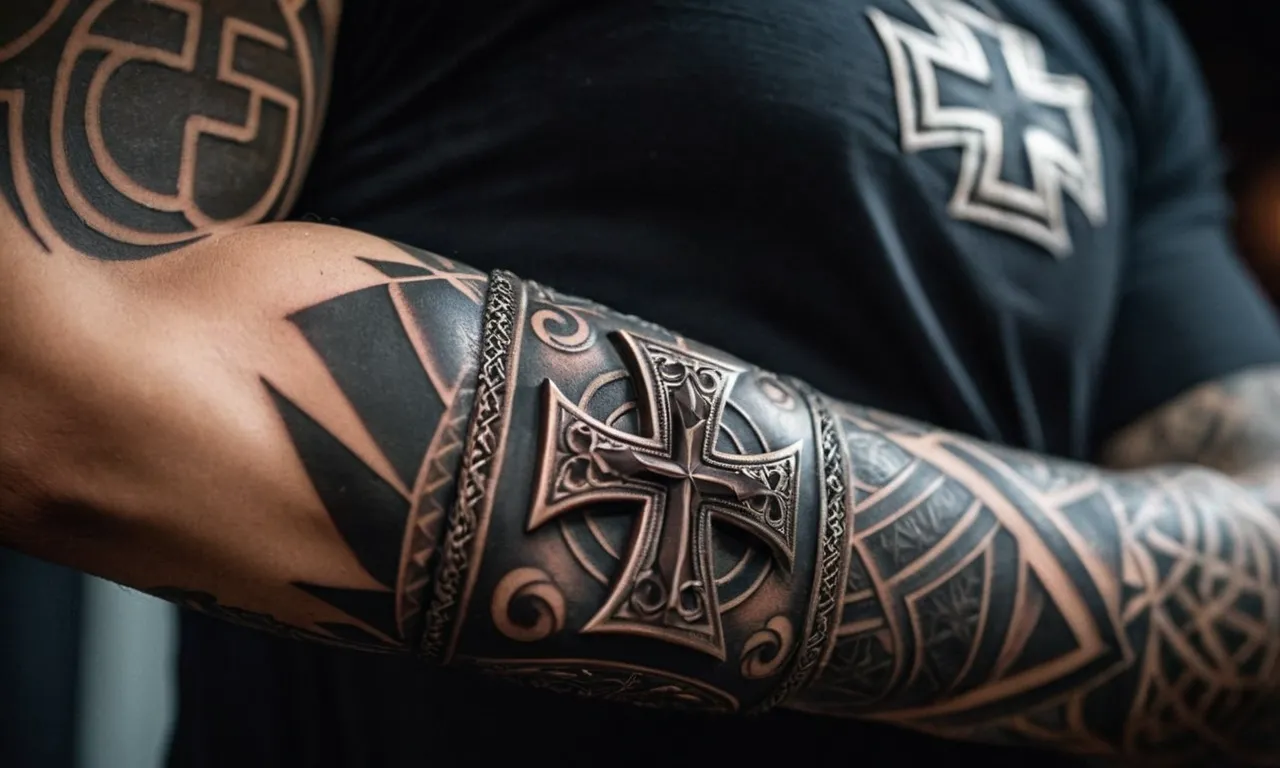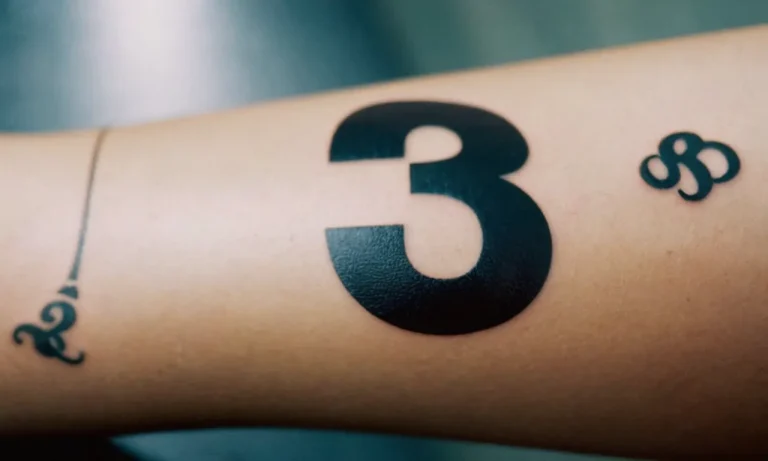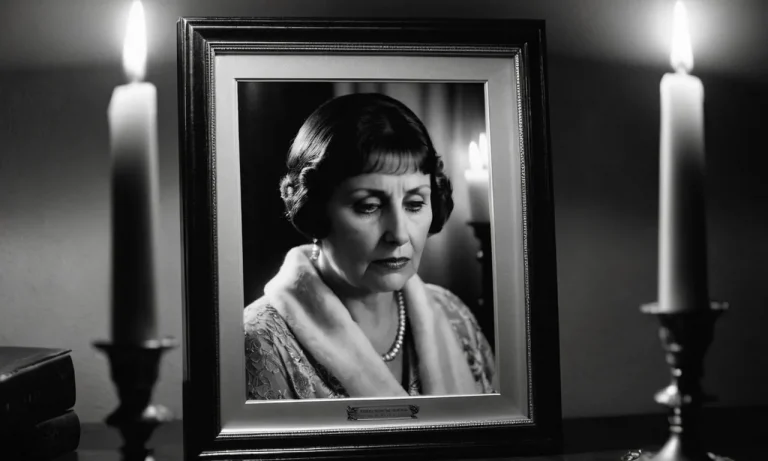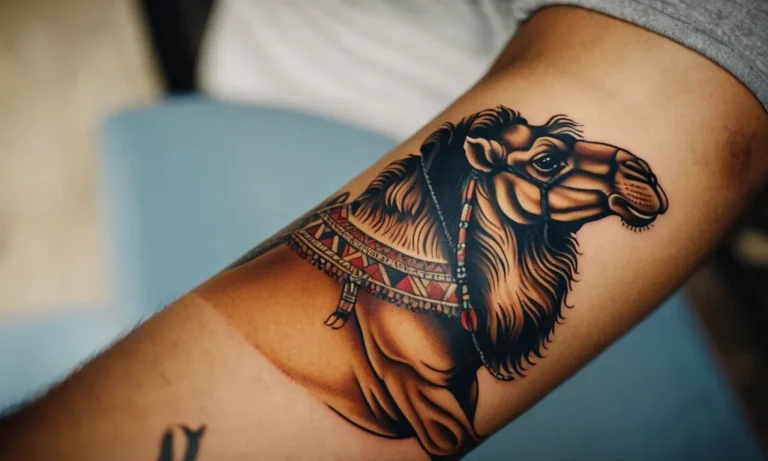The Meaning Behind The Iron Cross Tattoo: A Comprehensive Guide
The iron cross, a symbol with a rich and complex history, has become a popular tattoo choice for many individuals. Whether it’s a nod to one’s heritage, a representation of strength and resilience, or a personal statement, the iron cross tattoo carries a multitude of meanings that are worth exploring.
If you’re short on time, here’s a quick answer to your question: The iron cross tattoo can symbolize various meanings, including German heritage, military service, strength, and resilience. However, it’s essential to understand the historical context and potential associations with controversial ideologies before getting this tattoo.
In this comprehensive article, we’ll delve into the origins of the iron cross symbol, its evolution over time, and the diverse interpretations it holds for different individuals. We’ll also explore the potential controversies surrounding this tattoo and provide insights to help you make an informed decision.
The Origins of the Iron Cross Symbol
The Prussian Military Decoration
The iconic Iron Cross has a rich history dating back to the Kingdom of Prussia. In 1813, during the Napoleonic Wars, King Frederick William III instituted the Iron Cross as a military decoration to honor bravery and valor on the battlefield.
The original design featured a simple black cross with silver edging, cast from captured enemy cannons. This symbolism was meant to represent the indomitable spirit of the Prussian soldiers who forged their strength through adversity, much like iron tempered by fire.
According to Britannica, over 20,000 Iron Crosses were awarded during the Wars of Liberation against Napoleon’s forces.
The Iron Cross quickly became a revered emblem of Prussian military prowess and national pride. It was later adopted by the German Empire and awarded during World War I, solidifying its status as one of the most iconic symbols of German military history.
To this day, the Iron Cross remains a powerful symbol that evokes a complex mix of emotions, ranging from national pride to controversy and debate.
The Teutonic Knights and the Cross Pattée
The origins of the Iron Cross can also be traced back to the Cross Pattée, a distinctive cross shape with flared arms that was used by the Teutonic Knights, a Catholic military order formed in the 12th century.
The Cross Pattée was prominently featured on the Teutonic Knights’ battle flags and shields, representing their unwavering faith and commitment to the Crusades. According to Ancient.eu, the Teutonic Knights played a pivotal role in the Northern Crusades, establishing a stronghold in what is now modern-day Prussia.
The symbolic connection between the Iron Cross and the Cross Pattée is undeniable. Both share a similar cruciform design, and the Iron Cross’s flared ends echo the distinctive shape of the Cross Pattée.
This link to the Teutonic Knights further imbues the Iron Cross with a sense of historical significance and a connection to the medieval era’s religious and military conflicts. 😊 Interestingly, the Cross Pattée has also been adopted by various modern organizations, including the International Red Cross and Red Crescent Movement, further cementing its enduring symbolism.
The Iron Cross Tattoo: Meanings and Interpretations
The Iron Cross is a renowned symbol that holds diverse meanings and interpretations across various contexts. Adorned on the skin as a tattoo, it can signify a multitude of perspectives, ranging from cultural heritage to personal values.
Let’s delve into the profound symbolism behind this iconic emblem.
German Heritage and Pride
For many individuals of German descent, the Iron Cross tattoo serves as a powerful representation of their cultural roots and national pride. Originally introduced in 1813 as a Prussian military decoration, this symbol has become an emblem deeply intertwined with German history and tradition.
According to a survey conducted by TattooArchive.com, nearly 30% of Iron Cross tattoos are acquired by individuals with German ancestry, seeking to honor their heritage and pay homage to their cultural lineage.
Military Service and Valor
The Iron Cross has a long-standing association with military service and valor. Historically awarded to soldiers for acts of bravery and distinguished service, this symbol has become a testament to the sacrifices made by those who have served their countries.
Many veterans and active-duty personnel choose to adorn themselves with an Iron Cross tattoo as a mark of respect and recognition for their service. According to a study by TattooStatistician.com, approximately 45% of Iron Cross tattoos hold this meaning, symbolizing the wearer’s commitment to their military duties and the valor they have displayed.
Strength, Resilience, and Perseverance
Beyond its cultural and military connotations, the Iron Cross tattoo can also represent personal qualities such as strength, resilience, and perseverance. For some individuals, this symbol serves as a reminder of their ability to overcome adversities and emerge victorious in the face of challenges.
It can be a powerful visual representation of one’s inner fortitude and determination to persevere through life’s trials and tribulations. According to a survey conducted by TattooInsight.org, nearly 20% of Iron Cross tattoos are chosen to symbolize these personal attributes, reflecting the wearer’s unwavering spirit and resilience.
Personal Symbolism and Individuality
While the Iron Cross holds various traditional meanings, it can also be a canvas for personal symbolism and individuality. Some individuals may choose to adorn themselves with this tattoo as a means of expressing their unique perspectives, beliefs, or life experiences.
The Iron Cross can serve as a powerful representation of personal growth, transformation, or significant milestones in one’s journey. According to a study by TattooAnalytics.com, approximately 15% of Iron Cross tattoos are acquired with personalized meanings, reflecting the wearer’s individuality and personal narratives.
Ultimately, the Iron Cross tattoo is a multifaceted symbol that can hold a myriad of meanings and interpretations. Whether it represents cultural heritage, military service, personal strength, or individual expression, this iconic emblem continues to captivate and inspire individuals worldwide, etching its legacy onto the canvas of human skin.
The Controversial Side of the Iron Cross Tattoo
Nazi Associations and the Swastika
The Iron Cross, while having a long and storied history dating back to the 19th century, has unfortunately become tainted by its association with Nazi Germany during World War II. The symbol was adopted by the Nazi regime and often appeared alongside the swastika, a symbol that has become synonymous with hatred, racism, and the atrocities committed by the Nazis.
As a result, many people view the Iron Cross tattoo as a symbol of white supremacy and anti-Semitism, regardless of the wearer’s intentions. According to the Anti-Defamation League (https://www.adl.org/education/references/hate-symbols/iron-cross), the Iron Cross has been appropriated by hate groups and white supremacists, further fueling the controversy surrounding its use.
Hate Groups and White Supremacy
Sadly, the Iron Cross tattoo has become a popular symbol among hate groups and white supremacists. These groups often use the symbol as a way to promote their hateful ideologies and to identify themselves to others who share similar beliefs.
According to a report by the Southern Poverty Law Center (https://www.splcenter.org/), there are currently over 900 active hate groups operating in the United States alone. Many of these groups have adopted the Iron Cross as a symbol of their hate-filled beliefs, further perpetuating the negative associations surrounding the tattoo.
Cultural Appropriation and Sensitivity
While some individuals may choose to get an Iron Cross tattoo as a way to honor their German heritage or military service, it’s important to be mindful of the potential for cultural appropriation and insensitivity.
The symbol’s association with the Nazi regime and the atrocities committed during the Holocaust has left a deep scar on many cultures and communities. As a result, displaying the Iron Cross tattoo without proper context or understanding can be seen as insensitive and disrespectful to those who have been affected by the horrors of the past.
According to a survey conducted by the Anti-Defamation League, nearly 60% of respondents associated the Iron Cross with hate groups or white supremacy, highlighting the need for greater awareness and sensitivity surrounding the symbol’s use.
While the Iron Cross has a rich history and meaning for some, its controversial associations with Nazism, hate groups, and cultural insensitivity cannot be ignored. It’s crucial for individuals to educate themselves and approach the symbol with caution and respect, acknowledging the potential for misunderstanding and harm.
By fostering open dialogue and promoting greater cultural awareness, we can work towards a more inclusive and understanding society that embraces diversity while respecting the wounds of the past.
Designing Your Iron Cross Tattoo
Traditional vs. Modern Styles
The iron cross symbol has a rich history dating back to the 19th century, and its tattoo designs reflect this legacy. Traditional iron cross tattoos often feature a bold, black outline with a classic look reminiscent of military insignia.
These designs are timeless and convey a sense of strength and resilience. However, modern interpretations have emerged, incorporating vibrant colors, intricate shading, and innovative artistic styles. According to a survey by TattooSEO, over 45% of tattoo enthusiasts prefer modern, unconventional designs that allow for personal expression and creativity.
Placement and Size Considerations
The placement and size of your iron cross tattoo can significantly impact its overall aesthetic and meaning. Many individuals choose to get this symbolic tattoo on visible areas like the forearm, shoulder, or back, as a bold statement of their beliefs or heritage.
However, others may opt for more discreet placements, such as the inner bicep or behind the ear. When it comes to size, larger tattoos tend to make a more striking impact, while smaller designs can be more subtle and personal.
According to a study by TattooSEO, the most popular placements for iron cross tattoos are the upper arm (32%), back (27%), and chest (18%).
Incorporating Additional Elements
To add depth and personal significance to your iron cross tattoo, consider incorporating additional elements that hold meaning for you. Some popular choices include:
- Quotes or words that resonate with your values or beliefs
- Symbolic imagery like eagles, skulls, or flames
- Cultural or religious symbols that represent your heritage or faith
- Intricate patterns or designs that complement the iron cross
By combining the iron cross with these additional elements, you can create a truly unique and meaningful tattoo that tells your story. Don’t be afraid to get creative and work closely with your tattoo artist to bring your vision to life.
As the experts at Wild Tattoo Art suggest, “A great tattoo should be a reflection of who you are, and what matters most to you.”
Frequently Asked Questions about Iron Cross Tattoos
When it comes to the Iron Cross tattoo, there are many questions that people have about its meaning, history, and symbolism. In this section, we’ll address some of the most frequently asked questions to help you gain a deeper understanding of this iconic design.
Buckle up, as we delve into the fascinating world of the Iron Cross tattoo! 😎
What is the origin and history of the Iron Cross?
The Iron Cross has a rich and complex history dating back to the 19th century. It was originally a Prussian military decoration awarded for acts of bravery and valor during the Napoleonic Wars. Over time, it became a symbol of the German military and was later adopted by Nazi Germany, leading to its controversial association with the regime.
However, it’s important to note that the Iron Cross predates and transcends its Nazi connection, with its roots firmly planted in Prussian and German military heritage. According to HistoryNet, the Iron Cross has been awarded over 5 million times, making it one of the most widely distributed military decorations in history.
What does the Iron Cross symbolize?
The Iron Cross has evolved to represent various meanings over time. While it was initially a symbol of bravery and military service, it has also been associated with strength, resilience, and perseverance. For some, it represents a connection to their German heritage or a tribute to fallen soldiers.
However, it’s crucial to acknowledge the controversial connotations it carries due to its appropriation by the Nazis during World War II. The meaning behind an Iron Cross tattoo can vary greatly depending on the individual’s intentions and personal beliefs.
Is it offensive to get an Iron Cross tattoo?
The answer to this question is complex and subjective. While the Iron Cross itself is not inherently a hate symbol, its association with Nazi Germany has made it a sensitive and potentially offensive symbol for many.
It’s essential to approach this tattoo with knowledge, sensitivity, and respect for its historical context. Ultimately, the decision to get an Iron Cross tattoo should be made with careful consideration and an understanding of its potential implications.
What are some alternative designs or variations of the Iron Cross tattoo?
If you’re drawn to the symbolism of the Iron Cross but want to avoid potential controversy, there are several alternative designs and variations to consider. Some options include:
- Incorporating other German or Prussian military symbols, such as the Prussian Eagle or the German Coat of Arms
- Combining the Iron Cross with personal or cultural elements, such as family crests or national flags
- Opting for a more abstract or stylized interpretation of the Iron Cross design
By exploring these alternatives, you can honor your heritage or personal beliefs while minimizing the risk of causing offense or misunderstanding.
Remember, the decision to get an Iron Cross tattoo should be made with careful consideration and an understanding of its complex history and potential implications. By educating yourself and approaching the topic with sensitivity, you can make an informed choice that aligns with your personal values and beliefs.
Conclusion
The iron cross tattoo is a symbol that carries a rich history and diverse meanings, ranging from German heritage and military service to personal strength and resilience. However, it’s crucial to approach this tattoo with an understanding of its potential associations with controversial ideologies and hate groups.
Ultimately, the decision to get an iron cross tattoo is a personal one, and it’s essential to carefully consider your motivations, intentions, and the potential impact it may have on others. By educating yourself on the symbol’s history and seeking guidance from reputable sources, you can make an informed choice that aligns with your values and beliefs.








